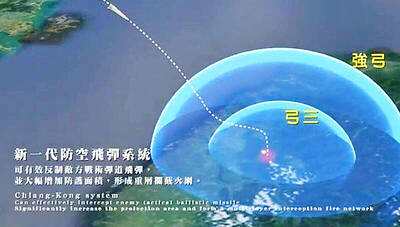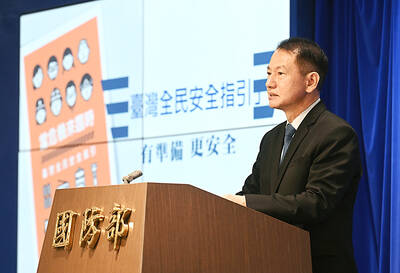Fresh fighting broke out yesterday between Myanmar’s junta and ethnic rebels forcing a continued flow of refugees into China, where a bomb killed one person, witnesses and state media said.
Clashes in Myanmar’s remote northeast have driven up to 30,000 refugees across the border in recent weeks, the UN has said, causing China to issue a rare admonishment to its neighbor and ally to resolve the conflict.
Battles that erupted this week in Kokang, a mainly ethnic Chinese region of Myanmar’s Shan state, have violated a 20-year ceasefire and analysts have warned the fighting could escalate into full-scale civil war.
Refugees were still crossing the border yesterday, said Khuensai Jaiyen, editor of the Shan Herald Agency for News.
“It’s not like the other day, we’re not hearing of too many but they are still crossing,” he said.
The state-run China Daily, quoting a Chinese Red Cross official, said a bomb was thrown across the border on Friday, killing one and injuring several others in a remote mountainous region of China’s Yunnan Province.
Only sketchy details of the fighting in Myanmar emerged yesterday, but China’s Global Times said one of its correspondents in the area witnessed “fierce” gunfire between the Kokang ethnic army and government forces.
The state newspaper said Chinese border guards had been put on alert to prevent the conflict from spreading to China.
A resident of China’s Zhenkang County on the border, who gave only his surname Xie, said he heard gunfire in the distance early yesterday.
“It was pretty loud. Everybody could hear it. I heard it for about an hour,” he said.
A statement from the Chinese foreign ministry on Friday said it “hopes that Myanmar can appropriately solve its relevant internal problems and safeguard the stability of the China-Myanmar border.”
It also urged its neighbor “to protect the safety and legal rights of Chinese citizens in Myanmar”.
China is one of the few allies of Myanmar’s isolated junta, its main source of military hardware and a major consumer of its vast natural resources, despite Western concerns over the military-ruled nation’s rights record.
Refugees who had crossed to the border town of Nansan were being housed in tents or other makeshift shelters and authorities were providing them blankets, medical care and other necessities, Chinese state media reports said.
The Global Times quoted Kokang leader Peng Jiasheng (彭家聲) as saying in an interview that his forces had killed more than 30 Myanmar government soldiers and captured another 50. It did not give his location.
The Washington-based US Campaign for Burma, which uses Myanmar’s former name, also said late on Friday around 30 junta soldiers had been killed with another 40 injured and 20 missing, citing local sources and ethnic media.
It said around 7,000 junta troops were now in the region, where they had at least eight military encounters with rebel groups on Thursday and Friday.
Win Min, a Thailand-based Myanmar analyst and academic, said tensions had grown because the junta was trying to exert control ahead of the elections next year.

LIMITS: While China increases military pressure on Taiwan and expands its use of cognitive warfare, it is unwilling to target tech supply chains, the report said US and Taiwan military officials have warned that the Chinese People’s Liberation Army (PLA) could implement a blockade within “a matter of hours” and need only “minimal conversion time” prior to an attack on Taiwan, a report released on Tuesday by the US Senate’s China Economic and Security Review Commission said. “While there is no indication that China is planning an imminent attack, the United States and its allies and partners can no longer assume that a Taiwan contingency is a distant possibility for which they would have ample time to prepare,” it said. The commission made the comments in its annual

DETERMINATION: Beijing’s actions toward Tokyo have drawn international attention, but would likely bolster regional coordination and defense networks, the report said Japanese Prime Minister Sanae Takaichi’s administration is likely to prioritize security reforms and deterrence in the face of recent “hybrid” threats from China, the National Security Bureau (NSB) said. The bureau made the assessment in a written report to the Legislative Yuan ahead of an oral report and questions-and-answers session at the legislature’s Foreign Affairs and National Defense Committee tomorrow. The key points of Japan’s security reforms would be to reinforce security cooperation with the US, including enhancing defense deployment in the first island chain, pushing forward the integrated command and operations of the Japan Self-Defense Forces and US Forces Japan, as

INTERCEPTION: The 30km test ceiling shows that the CSIST is capable of producing missiles that could stop inbound missiles as they re-enter the atmosphere Recent missile tests by the Chungshan Institute of Science and Technology (CSIST) show that Taiwan’s missiles are capable of intercepting ballistic missiles as they re-enter the atmosphere and pose a significant deterrent to Chinese missile threats, former Hsiung Feng III missile development project chief engineer Chang Cheng (張誠) said yesterday. The military-affiliated institute has been conducting missile tests, believed to be related to Project Chiang Kung (強弓) at Pingtung County’s Jiupeng Military Base, with many tests deviating from past practices of setting restriction zones at “unlimited” and instead clearly stating a 30.48km range, Chang said. “Unlimited” restrictions zones for missile tests is

PUBLIC SAFETY: The nationwide distribution campaign aims to enhance society’s overall understanding of threats and bolster defense awareness, an official said The latest edition of the National Public Safety Guide is being mailed to all citizens starting today to foster public awareness of self-defense in the event of war or natural disasters, the Ministry of National Defense said yesterday. “The guides will be disseminated to the public to enhance society’s overall understanding of threats and bolster defense awareness, demonstrating the government’s emphasis on people’s safety and its determination to pursue self-defense,” All-out Defense Mobilization Agency Director Shen Wei-chih (沈威志) said at the ministry’s news conference. The nationwide distribution campaign was planned according to President Lai William’s (賴清德) Sept. 20 directive, he said, adding